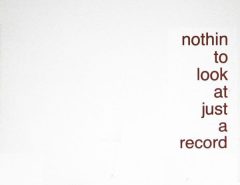 ElectroAcoustic Resource Site project
ElectroAcoustic Resource Site project
About EARS
The ElectroAcoustic Resource Site (EARS) project has been established to provide resources for those wishing to conduct research in the area of electroacoustic music studies. EARS will take the form of a structured Internet portal supported by extensive bibliographical tools. To aid the greater understanding of the opportunities offered by these radical forms of sound organisation, as well as their cultural impact, the project will cite (or link directly to) texts, titles, abstracts, images, audio and audio-visual files, and other relevant formats.
The project will strive to conceive of electroacoustic music in its widest possible sense, acknowledge the interdisciplinary nature of the field, and aspire to the greatest possible breadth and inclusiveness.
This said, the project authors acknowledge a current imbalance in the field. Areas already well served by the research community in terms of conferences and publications will be fully referenced, but what could be called the ’arts’ side of electroacoustic music studies will be developed in the greatest detail in future phases of the project.
The current site represents the completion of the preliminary phase of the project, namely the first instalment of a dynamic e-Glossary and Subject Index structure, to be regularly added to and refined as the project develops.
EARS received its first funding in 2001 and went online for the first time (English initial glossary and index only) in 2002. The project is co-ordinated at De Montfort University’s Music, Technology and Innovation Research Group (Leicester, UK) by Leigh Landy and Simon Atkinson in collaboration with the project’s Associated Researcher, Ricardo Dal Farra (CEIArtE-UNTREF and Hexagram), and the Research Fellows, Rob Weale and Pierre Couprie. EARS is supported by an international consortium consisting of Rosemary Mountain (Concordia University), Marc Battier (Sorbonne), Joel Chadabe (Electronic Music Foundation), Martin Supper (The Berlin University of the Arts) and Kenneth Fields (Peking University and China Central Conservatory of Music).




Leave a Reply
Lo siento, debes estar conectado para publicar un comentario.